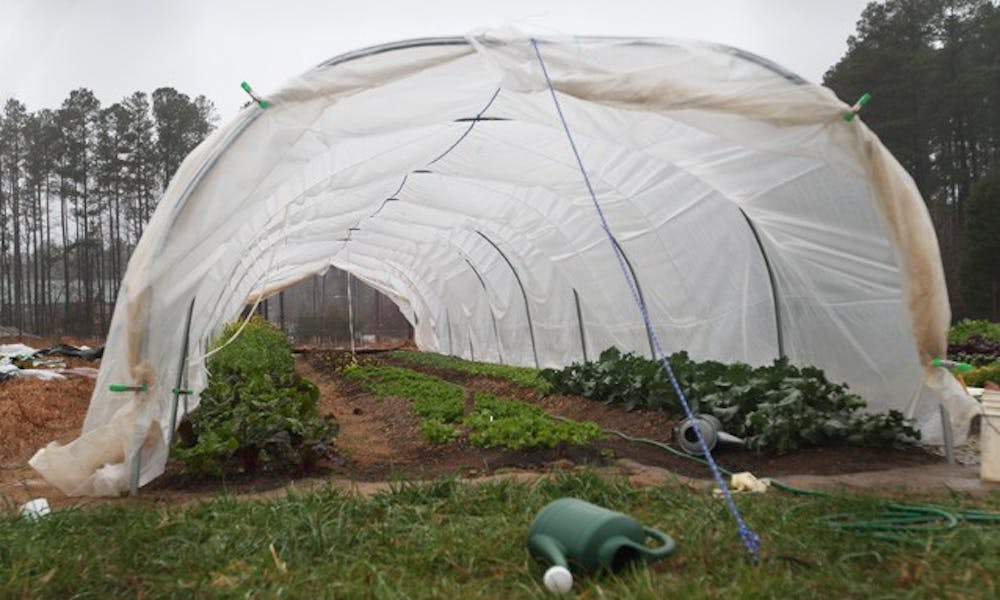A seed planted in the minds of several students has blossomed into a full-fledged farm.
The Duke Campus Farm celebrated its one-year anniversary this month. During the past year, the DCF transformed an area in the Duke Forest that has been unused since 1996 into a productive plot of land. During the Fall semester, student volunteers have invested more than 650 hours into the project. In the past year, the farm has generated approximately 5,000 pounds of produce.
Farm Manager Emily Sloss, Trinity ’10, has been with the Duke Forest-based farm since the beginning. Students developed the concept for the farm while enrolled in ENV 171: Food and Energy, a Spring 2010 class taught by Charlotte Clark, lecturer in sustainability education and faculty director of sustainability for the Nicholas School of the Environment. The students spoke with clients on campus—from Duke Dining to the University architect—and drew up plans for a farm.
“We knew where the land would be; we knew we had faculty support; we knew we had opportunities for funding—the only thing was a need for someone who cared enough about the farm,” Sloss said. “I decided I wanted to be that person—it was something I really cared about.”
Once the project was approved by several top administrators, among them President Richard Brodhead, the planners broke ground on the farm last November. The farm reaped its first harvest in April and continues to harvest weekly or biweekly to support the needs of Duke’s dining halls, Sloss said.
Fresh from the farm
The Duke Sustainability Office manages the farm and has hired interns for support. Sustainability Outreach Coordinator Casey Roe said the farm is not financially self-sufficient, or even close to it. Half of the farm’s funding comes from the Sustainability Office and the rest comes from Duke Dining and Bon Appetit Management Company, Roe noted.
“Right now the setup is that all the produce goes to Bon Appetit eateries on campus,” Roe said. “We’re tracking everything, but we’re not selling it—because of their contributions, they basically own the produce.”
Roe noted that the farm does not follow a traditional business model.
Last year Bon Appetit, which runs on-campus venues such as the Marketplace and the Great Hall, agreed to buy all of the farm produce and will serve a partial amount in its eateries. Of the 5,000 pounds of organic food produced in the past year, Bon Appetit has served 4,000 pounds of it in on-campus eateries, Roe said, adding that the rest went to other buyers because Bon Appetit’s demand decreased in the summer.
A community effort
Managing the farm requires labor from multiple parties. The farm is entirely organic and only owns one piece of equipment—a rototiller. Roe said weeds are hand-pulled and insect pests are hand-squashed—methods which will eventually improve the farm’s soil.
The DCF invites volunteers to labor on the farm Sunday mornings, helping to plant, weed and harvest crops. More than 150 students have volunteered at the farm since its inception, Sloss said.
Sophomore Paige Arnold had never been to a farm before she volunteered. She spent a workday weeding and harvesting carrots in November.
“It’s so hard to know where your food comes from nowadays,” Arnold said. “[The Duke Campus Farm] is very grassroots, very small—but I think that’s good.”
Arnold said she has no intention of becoming a farmer but appreciated the opportunity to learn about food production.
Indeed, Sloss said the goal of the farm is not to produce agriculturists but to encourage students to reevaluate their eating habits.
“We’re not necessarily trying to create the next generation of sustainable farmers, but Duke does produce the next generation of policymakers and business leaders,” Sloss said. “It’s important to educate them about sustainable farming.”
A bright, green future
The DCF has its goal set on expansion.
“The dining halls serve thousands of meals a day—the amount [of food] we’re producing right now isn’t really enough to make a dent,” Sloss said. “Each year we’re adding more production space. Each year we’re contributing more and more to their demand.”
Although it is located on a 12-acre site, only one acre of the land is currently being used to grow crops, and only half of that acre is in production at a given time, in accordance with crop-rotation practices.
“In the future, we’re planning to expand, to have an orchard, a vineyard possibly, some berry patches and some field crops,” said junior Emily Mendenhall, who has been with the farm since the beginning. “We’d expand some things that are perennials, like rhubarbs, strawberries—perennials will continue to enrich the soil over time.”
Mendenhall currently volunteers periodically and works to promote the farm through Students for Sustainable Living, a student employment program run by the Sustainability Office.
The farm recently held a fall festival, at which members of the Duke and Durham communities were invited to eat food, play games and tour the farm. Mendenhall said the farm has also hosted sessions on sustainable eating and is being incorporated into the curriculum of an increasing number of courses.
“We’ve had fraternities come out [to volunteer]—we’ve had groups come out,” Mendenhall said. “In the future, we hope to have speakers from different walks of life come to the farm and hold educational workshops.”
There are a million reasons to support local farms, Sloss said, including the satisfaction of growing one’s own food.
“It went from a garden project to an all-consuming farm,” Sloss said. “The first time any of us harvested something that we planted from seed has been the most rewarding experience.”
This article has been updated to reflect that half of the farm’s funding comes from the Sustainability Office and the rest comes from both Duke Dining and Bon Appetit Management Company.
Get The Chronicle straight to your inbox
Signup for our weekly newsletter. Cancel at any time.

